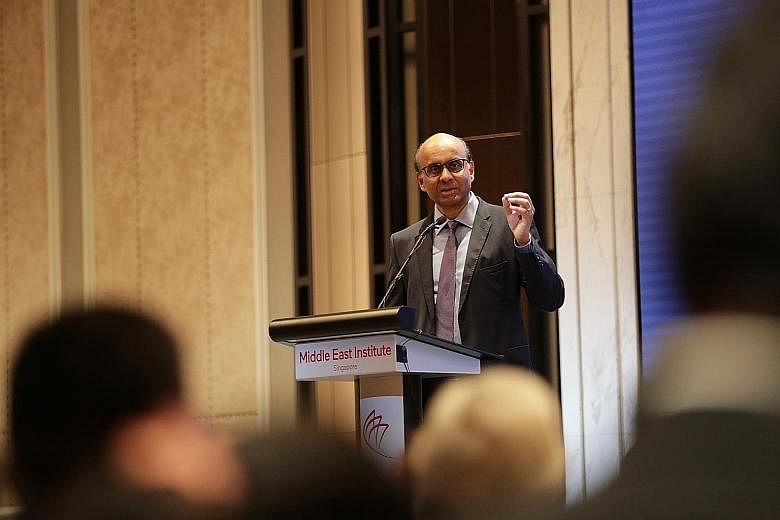Developing regions in the Middle East and East Asia are significantly performing below their potential, said Senior Minister Tharman Shanmugaratnam yesterday.
But he added that these countries can still reap "very significant" benefits from integrating with the world, despite the global economic slowdown and changes in the global environment.
"I think pessimism around integrating with the global economy is vastly overstated in the commentaries that you read, and also vastly overstated in a lot of the political narrative," Mr Tharman told about 300 audience members at the Middle East Institute's annual conference at Orchard Hotel.
"It is still, today, a much more open, global economy than it was. So the momentum has slowed, confidence has dimmed, but the state of the world today is far more integrated than it used to be."
Mr Tharman, who is also Coordinating Minister for Social Policies, added that both the Middle East and East Asia, which encompasses South-east Asia, must adapt to the new environment.
"(They) need to adjust their strategies - embark on some new strategies, as well as pursue some old strategies with a greater persistence, discipline and commitment - in order to do well in this new environment."
The developing economies of South-east Asia are underperforming by about 2 percentage points of growth each year, he said, while the economies of the Middle East are underperforming by about 4 percentage points each.
The two-day conference - titled The Middle East In Transformation: Are There Lessons From East Asia? - will have participants discuss political and societal changes in the Middle East, and debate on whether the East Asian experience is relevant to the region.
Speakers include academics from both regions.
During his speech, Mr Tharman listed common challenges that people in both regions face. These include maximising human potential, building infrastructure and coping with climate change.
For instance, sustainability must be built into infrastructure, or "we lock ourselves into an unsustainable future". He added that the scale of infrastructure required in these regions is beyond the capacity of the public sector, which, nevertheless, plays an important role.
"The public sector is critical for providing policy certainty, regulatory clarity and to mitigate risks because infrastructure is still too risky a game in the emerging and developing world."
He also underlined the importance of openness to the global economy and financial inclusion - that is, making sure people have access to useful and affordable financial products and services. For instance, less than half the population in the Middle East have access to a bank account or an account with some financial institution, Mr Tharman said.
His points were echoed by other speakers at the conference, including former Egyptian foreign minister Nabil Fahmy, who delivered the keynote address.
Mr Fahmy pointed out that in the Arab world, nearly 70 per cent of the population are under 35. The highest rate of unemployment in many countries there is among the educated youth, he added.
"This is a tremendous waste of resources and a kernel of serious long-term social and political problems," he said.


